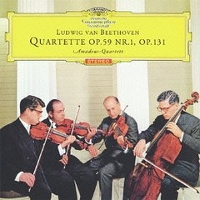Post by Beagle September 10, 2012 (1 of 18)
|
|
"Japanese original release. Uses 2012 DSD master based on the Deutsche Grammophon's original analog tape. Reissue features the high-fidelity SHM-SACD format ... the ultimate Super Audio CD that utilizes the materials and technologies that were developed for the SHM-CD to further enhance the audio-resolution."
I have these performances as a CD box-set, so I just mow gave a listen to Op. 131 and -- in spite of the warbling, edgy redbook sound-- was much impressed by the heart-thumping power of the Amadeuskvartetten rendition, both in the presto and lento.
|
|
|
Post by ramesh September 11, 2012 (2 of 18)
|
|
I considered buying this last week from CD Japan, but passed it up for the EMI SACD 'Richter in Italy' [ Schumann ].
Sure, Op 59/1 and 131 is a generous disc, if one overlooks the fact that a single layer SACD could accommodate all the late quartets in stereo. For the first Rasumovsky on SACD, there's the marvellous Quartetto Italiano performance on Pentatone. Not even the Végh give a more penetrating rendition of this quartet's slow movement than the Italians-- and I can't say that the sumptuous tonal blend and intonation of the Italians is in any way surpassed by the Amadeus. I haven't heard the Amadeus in the late quartets. At least for the moment, the Quartetto Italiano's 1960s recordings have yet to make it to SACD. But were the Amadeus celebrated for these works in the way that their late 1950s Schubert D810 is justly praised?
I have the Tokyo quartet and the Prazak for the late quartets on SACD. I haven't heard the latter for some time. The Tokyo's C# minor persuades, but lingers in reticence-- akin to Kawabata and Ozu rather than Haruki Murakami or Kurosawa.
|
|
|
Post by Beagle September 11, 2012 (3 of 18)
|
|
|
|
|
|
Post by ramesh September 14, 2012 (4 of 18)
|
|
http://www.telegraph.co.uk/culture/books/bookreviews/9464673/Freedom-and-the-Arts-by-Charles-Rosen-review.html
I was skimming through Charles Rosen's fascinating new compilation today. Rosen refers to an academic article on the early performances of Beethoven's late quartets. Apparently the first performers of Op131, the Schuppanzigh Qt, were dumbfounded by Beethoven's directions to play all the movements without intervening breaks. The quartet wondered how the audience could express its real-time admiration for any particular movement, and how the audience might provide feedback as to which movement ought to be encored immediately! It appears that Beethoven's late quartets also mark a turning point in the prescribed behaviour of audiences towards ritualised solemnity. Incidentally, Rosen remarks that the metronome markings in the piano reductions by Hummel and similar composers for the symphonic works of Mozart and Haydn indicate that these pieces were generally played more briskly than mid or even later 20th century musical practice. The notable exception to this lay in the speed of the finales, which may have been taken at relatively leisurely tempi in contemporary practice compared to the modern era. Rosen attributes this change to the purging of audience participation between movements : he claims that conductors felt the urge to compensate by whipping up extra excitement for the conclusion of the work.
It's a pleasure to recommend this Rosen book after I was cool in my SACD review of his Fone disc of Mozart piano works.
|
|
|
|
|
|
ramesh said:
It's a pleasure to recommend this Rosen book...
All of his texts are basically marvellous and should more or less be prescribed as textbooks for anyone into music (and even more broadly 'art') appreciation, whether one is only beginning or already advanced in one's pursuit of musical pleasures and enlightenment.... Starting with the classic "The Classical Style" of course. Excellent scholarship and writing which neither are limited by the constraints of pure musicology but show a much broader focus and understanding of what is being talked about and its context (including things like books [he has a degree in French literature], food, the fine arts, and the rest of the general culture).
I still relish the memory of the big spat he had (on the pages of the New York Review of Books) with Alfred Brendel over the exact meaning of Beethoven's "poi a poi di nuovo vivente" for the 2nd fugue of the op. 110 -- delicious and obvoiusly very instructive.
But don't trust him on things like the meaning of Schoenberg and the New Music.
|
|
|
Post by fausto K September 15, 2012 (6 of 18)
|
|
Polarius T said:
But don't trust him on things like the meaning of Schoenberg and the New Music.
so, why not?
|
|
|
|
|
|
fausto K said:
so, why not?
Don't get me wrong: I think his "Arnold Schoenberg" is one of the better books on the latter's music, full of very compact and superbly formulated insights that help describe Schoenberg's relation to the traditional tonal order perhaps better than anything else I've read, but Rosen is very much of a classicist and textual analyst in heart who looks at things from the perspective of the past and its formal ideals. For the broader cultural meaning of Schoenberg and what he did and represented (or an interpretation of him against the context of the cultural ethos and the broader material conditions of an era -- or, of a 'civilization', a term and an angle that I think Rosen would abhor as far too 'vague' for musicological purposes), perhaps the best guide still today is Thomas Mann's "Doctor Faustus"...from a man even more marooned in a bygone world, to be sure.
But that's a discussion for another thread or site.
|
|
|
Post by ramesh September 15, 2012 (8 of 18)
|
|
Polarius T said:
For the broader cultural meaning of Schoenberg and what he did and represented (or an interpretation of him against the context of the cultural ethos and the broader material conditions of an era -- or, of a 'civilization', a term and an angle that I think Rosen would abhor as far too 'vague' for musicological purposes), perhaps the best guide still today is Thomas Mann's "Doctor Faustus"...from a man even more marooned in a bygone world, to be sure.
And to circle this neatly back to late Beethoven, Mann's chief guides in 'Doktor Faustus,' especially for the sections of literary-musicological exegesis- for instance, the variations of Op111, seem to have been Adorno reporting on Schenker's analysis of these works.
Rosen in this book has some amusing remarks on Adorno, for instance the latter's consternation at being unable to find any sonata form passages in Beethoven's Missa Solemnis.
|
|
|
Post by fausto K September 15, 2012 (9 of 18)
|
|
ramesh said:
And to circle this neatly back to late Beethoven, Mann's chief guides in 'Doktor Faustus,' especially for the sections of literary-musicological exegesis- for instance, the variations of Op111, seem to have been Adorno reporting on Schenker's analysis of these works.
Rosen in this book has some amusing remarks on Adorno, for instance the latter's consternation at being unable to find any sonata form passages in Beethoven's Missa Solemnis.
Thanks Polarius & Ramesh for your responses.
I had just been contemplating whether I should read Rosen's Schoenberg book, Adorno's Philosophy of New Music having been my only source for years (very much slanted against Stravinsky, a composer whom I have come to appreciate more and more).
As to Adorno being Mann's guide for Dr. Faustus, in his Adorno biography Stefan Müller-Doohm provides exciting details about their collaboration during the war in California and how later on Adorno didn't get the recognition from the Manns (especially due to Mann's wife Katia) that he had hoped for. For those who don't read German, I think the biography has been translated into English.
|
|
|
Post by Beagle September 15, 2012 (10 of 18)
|
|
fausto K said: so, why not?
A thought-provoking question, thank you!
The thought provoked in my mind was, "Hmm, I have to forget everything-I-know-about-music in order to enjoy Schönberg and the 2. Wiener Schule." and that takes effort. This Off-Topic parenthesis serves well to define what this disc offers: 'oldie but goodie' Classicism (but still avant-garde to my ears).
|
|

